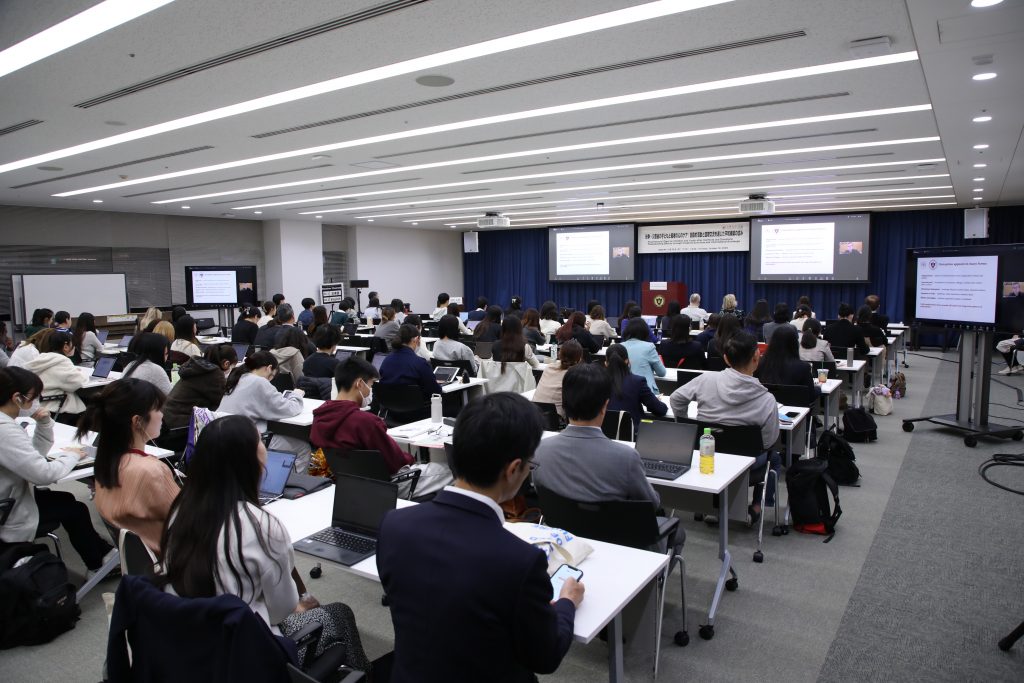From 6 to 30 October, the 24th Sophia University United Nations Weeks were held on the theme of ‘Considering the World and Our Future Through UN Activities’. This flagship event attracted over 1,000 participants from Japan and abroad every year, including current and high school students, as well as members of the public. During the event, five diverse programs were held, including discussions on Middle East issues, and providing mental wellbeing support in conflict zones, career workshops for those aspiring to work in international organizations, a report on the UN’s involvement in the Osaka-Kansai Expo, and sessions exploring society’s evolution with the advent of information and communication technology.
Symposium: UN’s 80th Anniversary and Participation report of Expo 2025 Osaka, Kansai
To mark the 80th anniversary of the United Nations (UN) on the 24th, a lecture featuring Mr. Maher Nasser, Assistant Secretary-General of the UN, and Representative of the UN Pavilion Exhibition Area for the Osaka-Kansai Expo, was held. Multilateralism is said to be in crisis, with the power of international cooperation to effect change weakening in the face of conflicts between democracy and authoritarianism, growing economic disparities and other challenges. Nevertheless, the UN, a symbol of multilateralism, is still expected to play a significant role, even as the international landscape undergoes significant changes. The lecture aimed to reflect on the UN’s journey thus far and explore how it should confront future societal shifts.
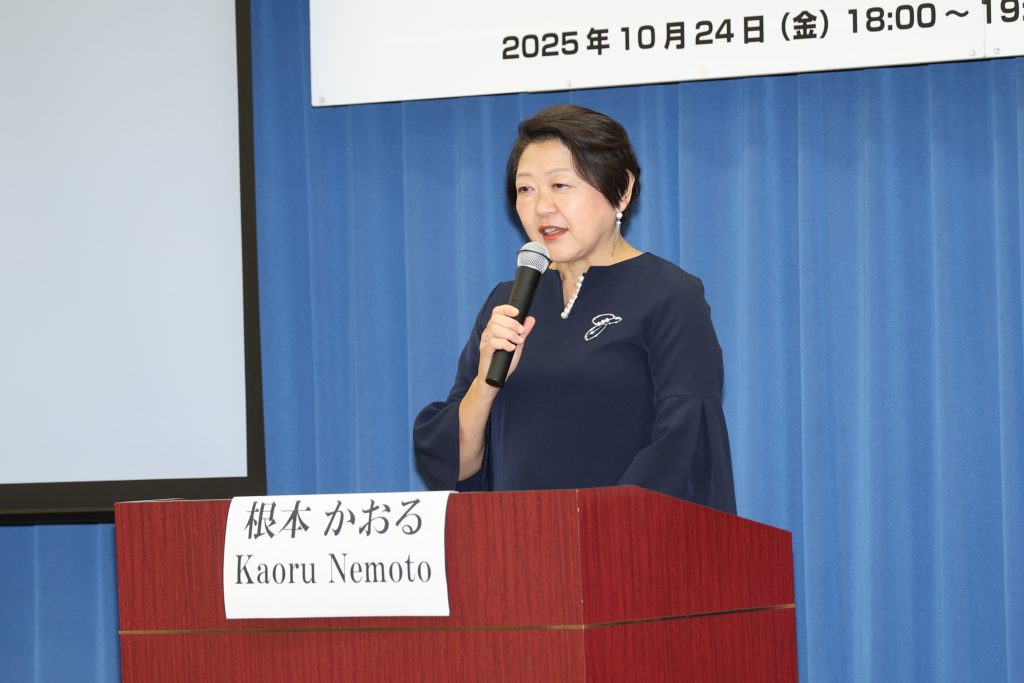
Ms. Kaoru Nemoto, Director of the United Nations Information Center, opened the event by presenting a video message from UN Secretary-General António Guterres. She then addressed the role and purpose of the United Nations, emphasizing that revitalizing the UN system requires member states to take the lead in decision-making. She then expressed her hope, stating: “In a globalized society, no challenge can be solved by a single country alone. The UN is a diplomatic forum where nations pursue their interests in alignment with those of the international community, so strengthening multilateralism centered on the UN serves national interests.”
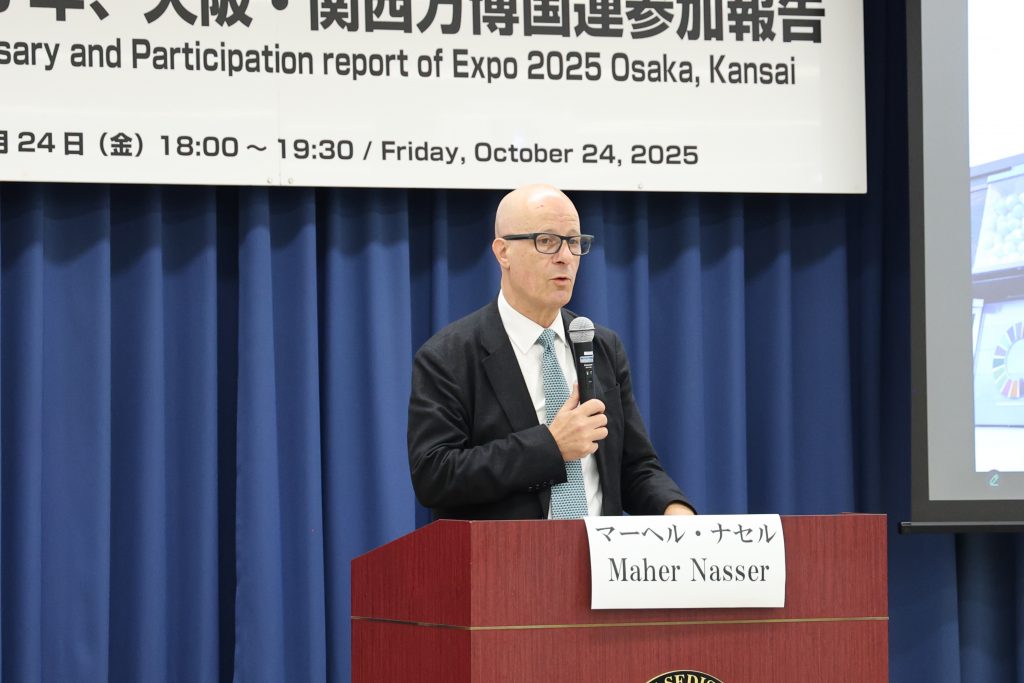
Mr. Nasser then delivered the keynote address, outlining the UN’s 80-year journey and the impact of its initiatives on people. He also discussed the purpose of the zone-based exhibits at the UN Pavilion and shared survey results on visitor demographics and feedback. He stated, “Looking at population shifts by country and region, moving toward a new reality is inevitable, bringing both challenges and opportunities. The need for global coexistence has never been greater. Multilateralism is the only means to address these diverse challenges.” Mr. Nasser expressed his determination to continue advancing reforms centered on the operational principles upheld by the United Nations.
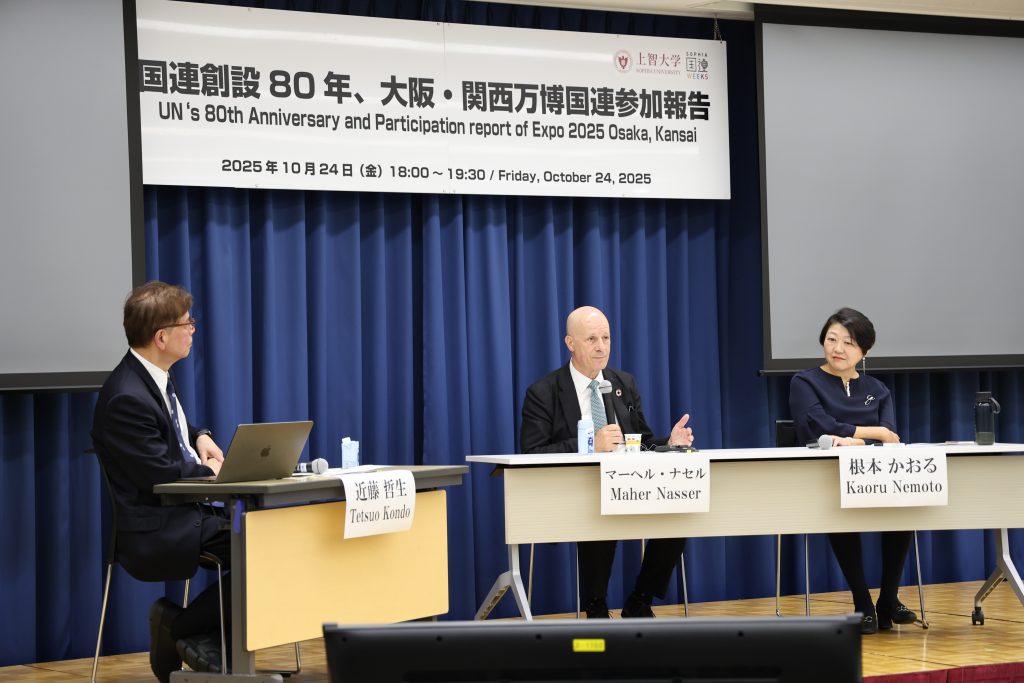
To conclude, a panel discussion was held with Professor Tetsuo Kondo, the director of Human Resource Center for International Cooperation at our university and a former UNDP representative in Japan, who served as the moderator. The session explored themes such as “How should the UN address the challenges facing humanity?” and “How should Japan contribute as a member state?” During the subsequent Q&A session, the approximately 100 in-person and online participants asked questions about topics such as engaging younger generations and careers at the United Nations. The session provided an opportunity to collectively consider the current challenges and hopes of the international community.
Symposium: “Psychosocial Care for Children and Youth after Conflicts and Disasters — Peacebuilding through Creative Activities and International Exchange”
On October 30, Sophia University hosted a symposium on psychosocial care for children and youth affected by conflicts and disasters, featuring case studies from Ukraine, Bosnia and Herzegovina, and Japan. While conflicts and natural disasters continue to inflict deep psychological wounds around the world, this symposium invited experts from the three countries to explore how creative activities and international exchange can contribute to lasting peace.
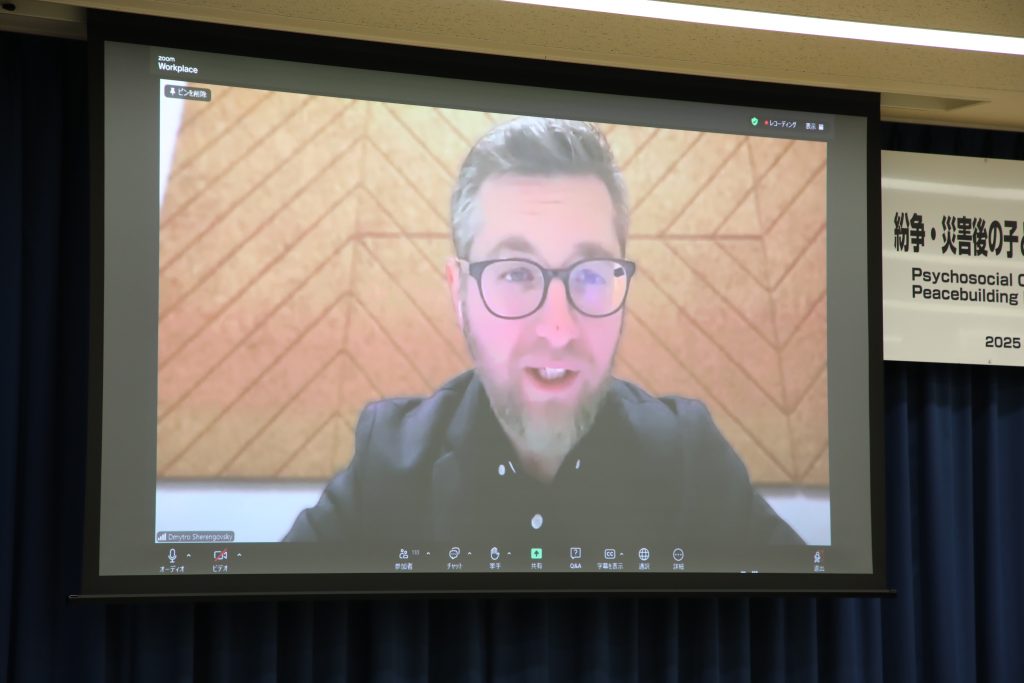
The event began with keynote lectures by Professor Dmytro Sherengovsky, Vice-Rector of the Ukrainian Catholic University, and Associate Professor Larisa Kasumagić-Kafedžić of the University of Sarajevo.
Speaking online, Professor Sherengovsky defined psychosocial needs in wartime and discussed challenges faced by young people, presenting examples of his university’s multi-layered responses. He emphasized that “psychosocial needs are often dismissed as a “soft” issue but neglecting them undermines the foundations of a nation. Universities have a mission to help children overcome trauma and realize their role as agents of renewal.”
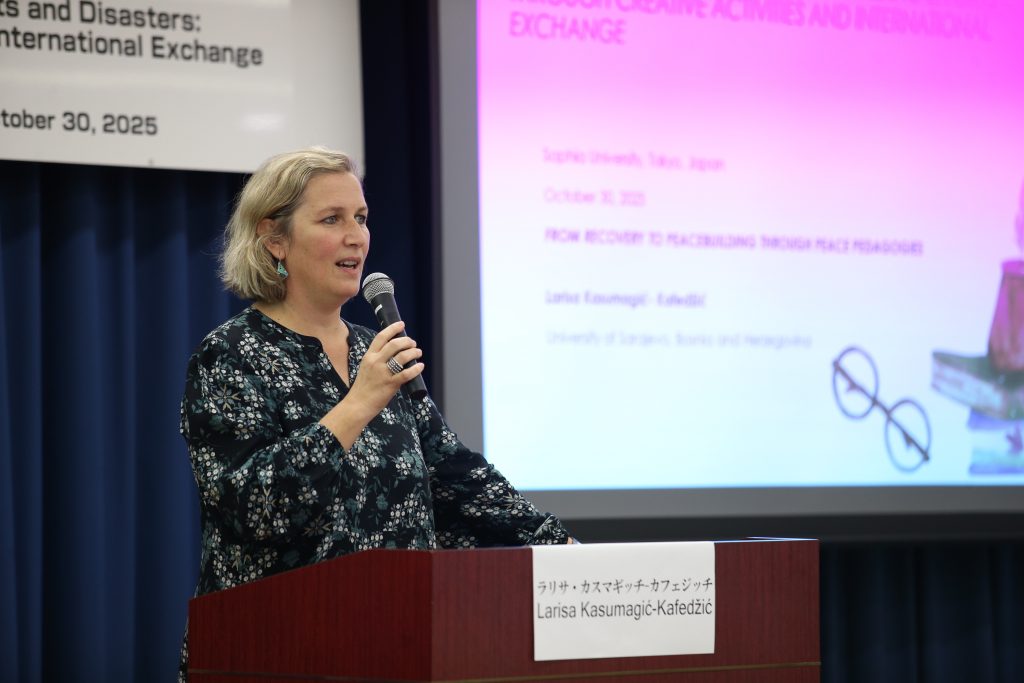
Associate Professor Kasumagić-Kafedžić traced the historical transformations of her country’s education system and stressed that “the effects of war persist long after it ends, making trauma-sensitive peace education indispensable. Education is never neutral ignoring its role in peacebuilding is equivalent to perpetuating cycles of harm.”
Next, Muhamed Kafedžić (“Muha”), a Bosnian painter and visual artist, shared his artistic philosophy and past works, highlighting the peacebuilding potential of art. Ryoko Honda, a clinical psychologist and board member of the Japan Association for Play Therapy, shared her experience conducting therapeutic play workshops in disaster-affected areas. She noted that “for children to feel safe and secure, it is essential to stimulate their creativity and senses through nonverbal means such as movement, art, and music, allowing them to express themselves without relying solely on words.”
Taro Komatsu, professor in the Department of Education at Sophia University, reported on international online exchange activities conducted among students from the three countries. He reflected that direct interaction among young people who have experienced conflict or disaster, as well as their engagement in creative collaborative projects that drew upon their own sensibilities, enabled them to share experiences and fostered deep mutual empathy.
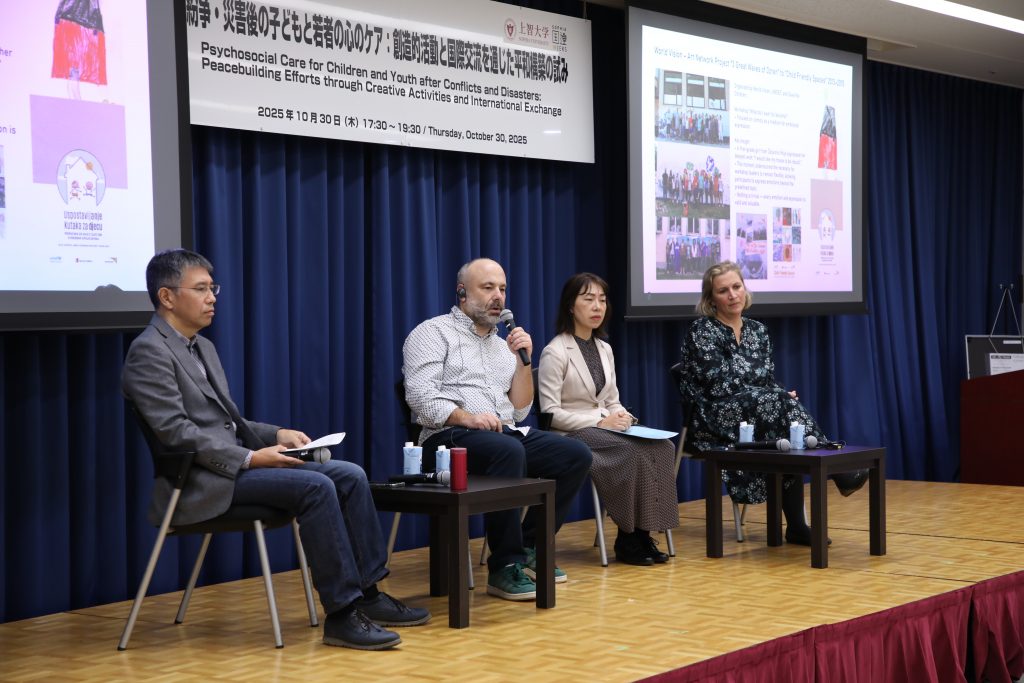
In the final panel discussion, participants exchanged practical insights on topics such as the meaning and cultivation of creativity and effective field practices. The floor was active with questions from the audience. Concluding the session, Professor Komatsu remarked, “Through play and art, participants experience the joy of creation. Expressing creativity nurtures hope that the future can be changed. Collaborative learning across cultures deepens creativity and helps us feel connected to society and the world.” The symposium concluded on a high note. Outside the venue, a collaborative painting created by Mr. Kafedžić and Sophia students was also exhibited.
This symposium was financially supported by the Sophia Symposium program.
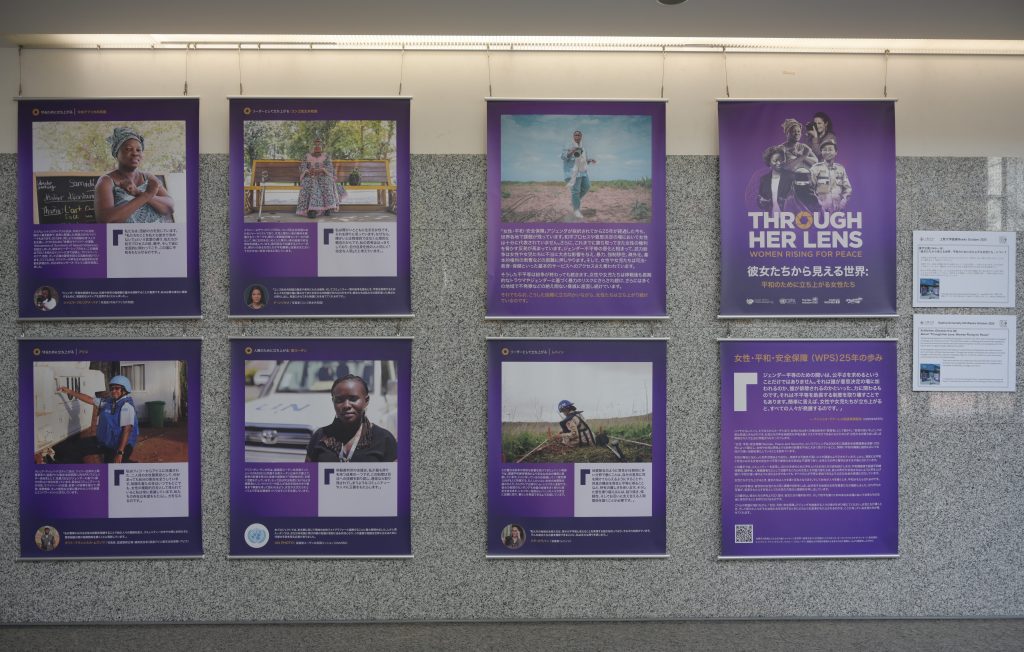
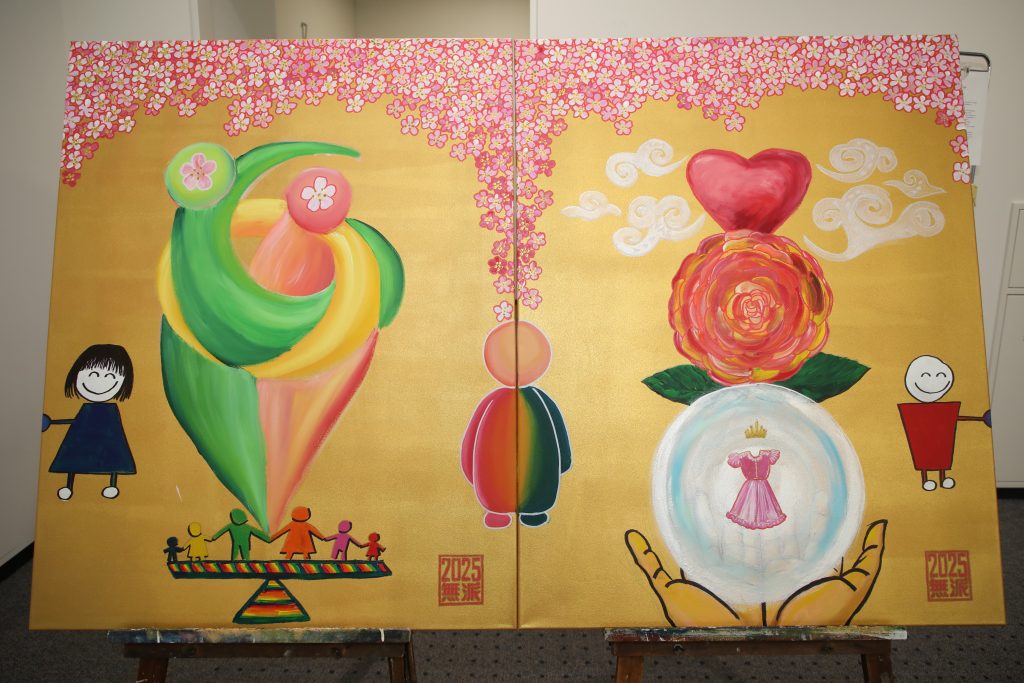
UN Weeks takes place twice a year, in June around World Refugee Day on June 20 and in October around UN Day on October 24. Going forward, we will continue leveraging the network between Sophia University and international organizations to provide a forum for discussing global challenges with leaders of international organizations, government officials, and researchers working on the front lines.
